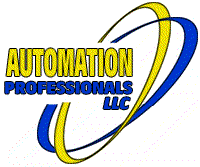|
The EtherNet/IP™
Communications Suite Module
provides I/O Scanning and I/O Emulation on top of partial emulation of a
Logix™
processor (Controller Tags and User-Defined data types). Use robust,
low latency UDP packets to communicate with Logix™ processors as one or more
I/O modules (passive slave mode), and with a variety of EtherNet/IP™ I/O
modules as an I/O scanner (active master mode).
As of September 23, 2024, this module is available on Ignition Edge. See
the sales policy document above. Be sure to use v2.1.18 or later on
Ignition Edge.
With the Controller Tag emulation, you can minimize unnecessary network
traffic using Data Table messages initiated as needed by your control
system, eliminating the corresponding OPC driver polling. The controller
tag emulation can also accept connections from other Ignition servers' Logix
v21+ driver, and is expected to work with a variety of generic HMI devices.
This driver also supports Producer/Consumer tag connections, python handlers
for communication events, and scripted use of low-level CIP messaging. Since
version 1.0.2, much of the configuration can be performed from the Ignition
Designer. Version 1.1 adds support for momentary pushbuttons directly connected
to I/O buffers. Version 1.2 adds support for multi-port bridging
and draft support for Logix Program Tags. Version 1.3 adds default tags and
assemblies for quick setup as an I/O slave, along with some Multicast UDP
fixes for Windows platforms. Version 1.4 improves support unaligned assembly
scatter/gather operations and adds support for assembly members that point
to subelements of tags, whether array elements or structure elements.
Major Version 2.0 introduces a new Client driver type
for improved communications with Allen-Bradley Logix Processors and Omron NJ/NX
family processors. The user manual includes the details of the new functionality,
with a preview of the further improvements and features that are planned.
Version 2.1 adds support for arbitrary access to CIP Attributes via the
Client Driver, with the option to provide structure type information to
decode complex attributes that are not pre-defined.
Version 2.1.7 adds support for arbitrary access to unbrowsed symbols via the
Client Driver, via explicit type and symbol definitions in
Supplemental XML.
Version 2.1.10 updates the Class1 Host Device (and Multi-slot Target) to
to support all of the new Logix datatypes properly in its configuration, and expands
the support for Logix predefined structured types through Rockwell's firmare
version 35.
Version 2.1.12 introduces Maker Edition support, and adds documentation for
the (beta) Keyence KV support. has been withdrawn due to a significant regression,
introduced in the 2.1.11 beta, first reported by a client using PlantPax.
Version 2.1.13 Re-introduces Keyence KV support and Maker support. Also fixes
some old bugs in the Host Driver.
Version 2.1.15 upgrades Producer/Consumer tag support to include structured types
and limited support for Data State Change events. Extensive documentation updates for
producer/consumer tag support. Also fixes a bug in Host Driver live JSON types export.
Version 2.1.16 fixes bugs in L5X import, particularly STRING data types and their
initialization values.
Version 2.1.17 fixes one more bug in L5X import, and brings the designer's
editor for types/tags/code/assemblies/scanners up to date. It includes, for the first
time, support for live editing of PROGRAM tags, and program-specific jython code.
Program tags and code were previously only configurable via XML.
Version 2.1.19 fixes bugs in Scanner connection failure handling
in a pair of code paths that broke its connection retry state machine. (2.1.18 was
a partial fix.)
Versions supporting Ignition 7.9 through 8.3 are available as follows:
| Ignition v8.3 |
Version 2.2.1 |
| Ignition v8.1 |
Version 2.1.19 |
| Ignition v8.0.14+ |
Version 1.4.2 (Unsupported, no further updates.) |
| Ignition v8.0.0-.13 |
Version 1.4.1 (Unsupported, no further updates.) |
| Ignition v7.9 |
Version 1.4.2 (Limited support, no further updates.) |
| Ignition v7.7.8+ |
Version 1.4.2 (Unsupported, no further updates.) |
Review the module documentation here.
Install
this EDS File
into Rockwell Software or your favorite scanner configuration tool for
maximum compatibility.
A demonstration of responsive user interfaces using passive mode
is available in a
Zipped project with ancillary files.
See its ReadMe file for installation instructions.
Load it into your development lab to see just how quick
Ignition Client to PLC communications can be.
(Note: This demo requires the Integration Toolkit module, formerly known
as Simulation Aids, too.)
|
